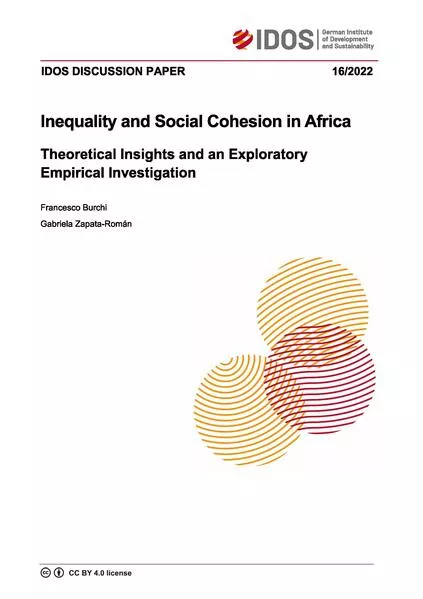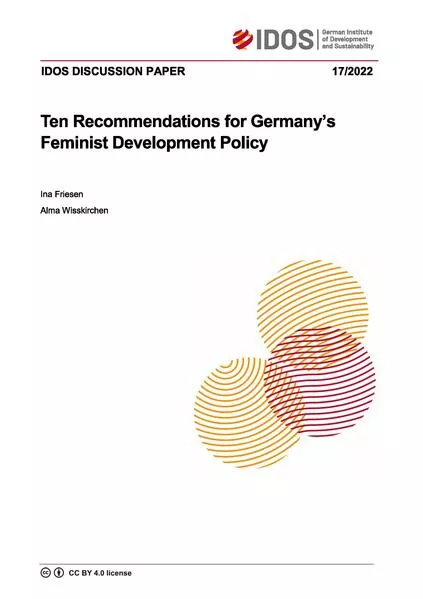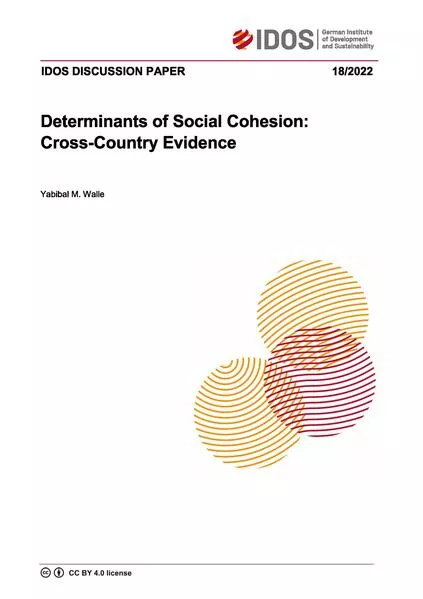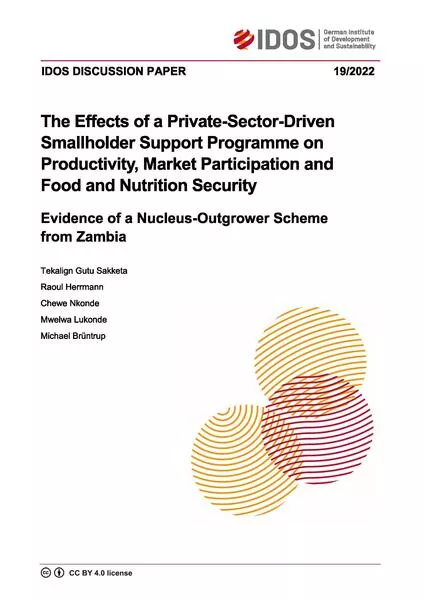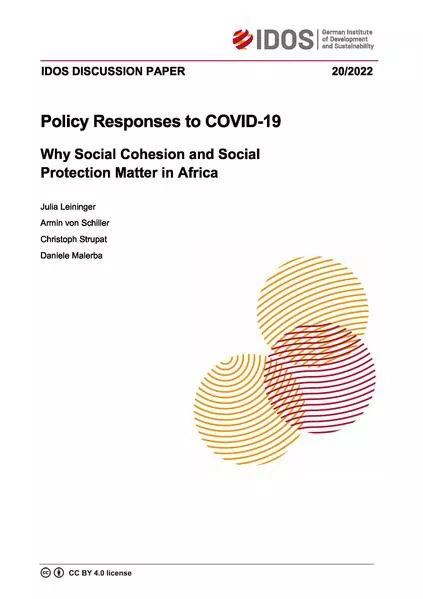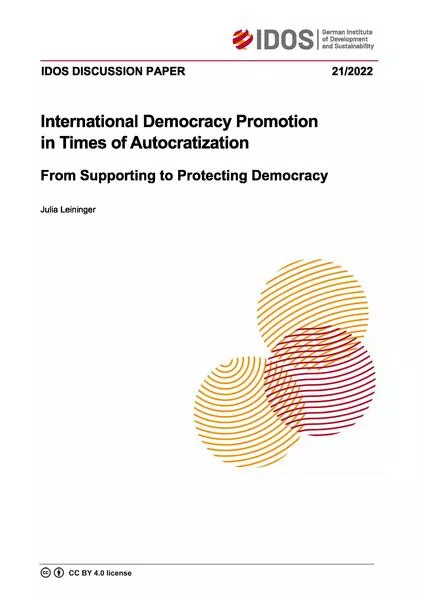Chronologie aller Bände (1 - 6)
Die Reihenfolge beginnt mit dem Buch "Inequality and social cohesion in Africa". Wer alle Bücher der Reihe nach lesen möchte, sollte mit diesem Band von Ina Friesen beginnen. Die Reihe umfasst derzeit 6 Bände. Der neueste Band trägt den Titel "International democracy promotion in times of autocratization".
- Anzahl der Bewertungen für die gesamte Reihe: 0
- Ø Bewertung der Reihe: 0
Diese Reihenfolge enthält 5 unterschiedliche Autoren.
- Band: 16
- Autor: Burchi, Francesco
- Anzahl Bewertungen: 0
- Ø Bewertung:
- Medium: Buch
- Veröffentlicht: 01.12.2022
- Genre: Politik
Inequality and social cohesion in Africa
Inequality is bad per se and has adverse effects, among other things, on economic development and the environment. It is also often argued that high and increasing inequalities put societies under stress, which increases the likelihood of social conflicts. However, the literature on this topic is scarce and some of the conclusions are not adequately supported by empirical evidence. This is mainly because there are different definitions and measurements of social cohesion. Moreover, some definitions of social cohesion incorporate inequality, thus making it impossible to examine how these two phenomena interact with one another.
This paper analyses both theoretically and empirically, the relationship between inequality and social cohesion. To do so, it employs a recent definition of social cohesion provided by Leininger et al. (2021). According to this definition, social cohesion is composed of three core attributes, namely trust, inclusive identity and cooperation for the common good. These attributes are examined in two dimensions, namely the horizontal (relationship among individuals) and vertical (relationship between individuals and state institutions) dimensions of social cohesion.
This paper provides an overview of the empirical evidence regarding the relationship between inequality and the three attributes of social cohesion. We find that while inequality is likely to have a negative effect on all three attributes, the intensity of the relationship may depend on some key mediating factors. Moreover, we highlight the main pathways through which inequality could affect each of the three key attributes.
The empirical analysis focuses on Africa. While there is some work in this field in Europe and Asia, to the best of our knowledge, there has not been any related empirical work thus far that has focused on African countries. To measure the three attributes of social cohesion, we use a database generated by Leininger et al. (2021), which is based on data from Afrobarometer and the V-Dem Institute. Inequality is mainly measured by the Gini coefficient and data are sourced from the World Income Distribution dataset. As expected, our analysis shows that countries with higher inequality usually have lower levels of social cohesion, which is measured by an aggregate index. This negative correlation holds when we analyse the relationship between the Gini coefficient and the three attributes separately; however, the intensity varies. It is stronger for trust (rho=0.25) compared with the other two attributes (both of which have a rho equal to approximately 0.1). Additional investigations point to substantially different results for the horizontal and vertical dimensions of social cohesion. Higher levels of inequality are associated with lower levels of horizontal trust and horizontal cooperation. On the other hand, higher levels of inequality are associated with higher levels of vertical trust and are essentially uncorrelated with vertical cooperation. These relationships remain substantially unchanged when we use measures of income inequality other than the Gini coefficient. Further analyses that aim to explain the puzzling results for the vertical dimension of social cohesion reveal that our findings are not clearly driven by trust in a specific institution and are also not an artefact of the specific data we used. Indeed, we obtain similar results using data from the World Values Survey. At the same time, it appears that the positive relationship between inequality and vertical trust is visible only among African countries, whereas it is not observed at the global level or for other regions. Further research is needed to confirm whether Africa is truly exceptional in this regard, and if so, why that may be the case.
This paper analyses both theoretically and empirically, the relationship between inequality and social cohesion. To do so, it employs a recent definition of social cohesion provided by Leininger et al. (2021). According to this definition, social cohesion is composed of three core attributes, namely trust, inclusive identity and cooperation for the common good. These attributes are examined in two dimensions, namely the horizontal (relationship among individuals) and vertical (relationship between individuals and state institutions) dimensions of social cohesion.
This paper provides an overview of the empirical evidence regarding the relationship between inequality and the three attributes of social cohesion. We find that while inequality is likely to have a negative effect on all three attributes, the intensity of the relationship may depend on some key mediating factors. Moreover, we highlight the main pathways through which inequality could affect each of the three key attributes.
The empirical analysis focuses on Africa. While there is some work in this field in Europe and Asia, to the best of our knowledge, there has not been any related empirical work thus far that has focused on African countries. To measure the three attributes of social cohesion, we use a database generated by Leininger et al. (2021), which is based on data from Afrobarometer and the V-Dem Institute. Inequality is mainly measured by the Gini coefficient and data are sourced from the World Income Distribution dataset. As expected, our analysis shows that countries with higher inequality usually have lower levels of social cohesion, which is measured by an aggregate index. This negative correlation holds when we analyse the relationship between the Gini coefficient and the three attributes separately; however, the intensity varies. It is stronger for trust (rho=0.25) compared with the other two attributes (both of which have a rho equal to approximately 0.1). Additional investigations point to substantially different results for the horizontal and vertical dimensions of social cohesion. Higher levels of inequality are associated with lower levels of horizontal trust and horizontal cooperation. On the other hand, higher levels of inequality are associated with higher levels of vertical trust and are essentially uncorrelated with vertical cooperation. These relationships remain substantially unchanged when we use measures of income inequality other than the Gini coefficient. Further analyses that aim to explain the puzzling results for the vertical dimension of social cohesion reveal that our findings are not clearly driven by trust in a specific institution and are also not an artefact of the specific data we used. Indeed, we obtain similar results using data from the World Values Survey. At the same time, it appears that the positive relationship between inequality and vertical trust is visible only among African countries, whereas it is not observed at the global level or for other regions. Further research is needed to confirm whether Africa is truly exceptional in this regard, and if so, why that may be the case.
- Band: 17
- Autor: Friesen, Ina
- Anzahl Bewertungen: 0
- Ø Bewertung:
- Medium: Buch
- Veröffentlicht: 01.12.2022
- Genre: Politik
Ten recommendations for Germany’s feminist development policy
In early 2022, Germany’s development minister Svenja Schulze announced the adoption of a feminist development policy. With this announcement, Germany joins a growing group of governments that have adopted or declared the adoption of an explicitly feminist perspective in their external policies. Drawing on these governments’ policies and the observations and recommendations by civil society and researchers, this Discussion Paper outlines ten key recommendations for Germany’s first feminist development policy. The first three recommendations focus on the conceptual foundation of the policy and lay out the importance of 1) an inclusive definition of gender, 2) a clarification of the feminist approach and the policy’s overall goal as well as 3) the need for an intersectional approach. The second set of recommendations concerns the implementation of the policy and stresses the importance of 4) a permanent cooperation with gender-focused and feminist organisations and 5) the necessity to increase funding for gender-related objectives in general and 6) for feminist organisations in particular. Further recommendations include 7) widening the range of sectors that target gender equality through a transformative approach and context-sensitive programming and by providing mechanisms to monitor and evaluate the implementation of the strategy’s goals, objectives and activities. The last three recommendations emphasise institutional aspects and the importance of 8) creating an institutional environment that best supports gender equality within the development ministry and its main implementing organisations, 9) the necessity of a coherent feminist approach between the different ministries, and 10) the importance of addressing possible challenges the ministry might face in the implementation of its feminist development policy.
- Band: 18
- Autor: Walle, Yabibal M.
- Anzahl Bewertungen: 0
- Ø Bewertung:
- Medium: Buch
- Veröffentlicht: 01.12.2022
- Genre: Politik
Determinants of social cohesion
Noting that few studies to date have investigated the determinants of social cohesion in a comprehensive and systematic manner, this paper examines the macro-level determinants of social cohesion using a panel of up to 92 developing and developed countries for the period 1990–2020. Employing the system GMM dynamic panel data estimator, which addresses endogeneity concerns by means of internal instruments, I find that the levels of education, government size, globalisation, and economic development have significantly positive effects on most dimensions of a country’s social cohesion. In contrast, inflation, corruption and income inequality are detrimental to social cohesion.
- Band: 19
- Autor: Sakketa, Tekalign Gutu
- Anzahl Bewertungen: 0
- Ø Bewertung:
- Medium: Buch
- Veröffentlicht: 01.12.2022
- Genre: Politik
The effects of a private-sector driven smallholder support programme on productivity, market participation and food and nutrition security
Nucleus-outgrower schemes (NOSs) are supposed to be a particularly effective private-sector mechanism to support smallholder farmers and contribute towards mitigating the problematic aspects of pure large-scale agricultural investments. This discussion paper uses panel household survey data collected in two rounds in Zambia to analyse some agro-ecological and socio-economic impacts of the outgrower programme of one of the largest agricultural investments in Zambia: Amatheon Agri Zambia (AAZ) Limited. The descriptive results show that the type of participation in the programme varies across participants and components, with most participating in trainings. Econometric results suggest the following key findings. First, although the overall impact of the AAZ outgrower programme on the uptake of conservation agriculture practices is robust and promising, impacts on the adoption of other agricultural technologies is less obvious and the effect depends on the type of support provided. Second, the programme has had a significant impact on maize productivity promoted in the initial phase but not on the other crops – mainly oilseeds – promoted later. Third, the initially less productive farmers seem to benefit slightly more than already better performing ones. Fourth, although the impact on overall household security was insignificant, there is some suggestive evidence (although the effect is weak) that the programme has a positive effect on improving women’s uptake of micronutrients. Finally, our findings show that the three components of the programme (trainings, seed loans and output purchases) have different effects on the adoption of sustainable agricultural practices and productivity, and to some extent on food security. Overall, the results suggest that NOSs, with all their risks, can play a role in the adoption of sustainable agricultural practices, improving farm-level agricultural technologies, providing input credit, and thereby improving productivity and smallholder livelihoods. However, this is not automatically the case, as it crucially depends on the design and management of the project; the availability of good policies and institutions governing the rules of operation; the types of crops promoted; the duration of the project; and the political commitment of host countries, among others.
- Band: 20
- Autor: Leininger, Julia
- Anzahl Bewertungen: 0
- Ø Bewertung:
- Medium: Buch
- Veröffentlicht: 01.12.2022
- Genre: Politik
Policy responses to COVID-19
This empirical analysis investigates whether and to what extent social cohesion and the coverage of social protection schemes influence governments’ decisions about the stringency of COVID-19 containment policies during the first and second waves in 2020 in Africa. Our results indicate that societal and social factors influenced the stringency of containment policies. Social cohesion has a negative effect on the stringency of containment policies in response to COVID-19 over time. Social protection coverage has a positive effect on the stringency of containment policies in response to COVID-19 over time. States implemented more stringent containment policies in less cohesive societies if they already had social protection schemes in place before the pandemic. Contextual factors mediated these effects. While stringency of containment policies softened over time where levels of democracy, poverty, and inequality were higher, social protection made a mediating difference only in autocratic states and societies with higher poverty. Three contributions of the empirical analysis stand out. First, the conceptual integration of societal and social factors (“societal triangle”) provides a novel basis from which to analyse policy responses during external shocks like a global pandemic. Second, to overcome the limitations of current measurements of social cohesion, we use a novel measurement to determine pre-pandemic levels of social cohesion. Third, this is the first cross-national study that addresses a world region, Africa, which has gained little attention in the study of policy responses to the COVID-19 pandemic.
- Band: 21
- Autor: Leininger, Julia
- Anzahl Bewertungen: 0
- Ø Bewertung:
- Medium: Buch
- Veröffentlicht: 01.12.2022
- Genre: Politik
International democracy promotion in times of autocratization
The worldwide wave of autocratization is doing away with many of the democratic achievements made since 1989. Scholarship on international democracy promotion is yet to theorise how democracy can be protected from autocratization. Such a theory must account for different democratic and autocratic trajectories as well as integrate theoretical approaches from international relations and comparative politics in the study of democracy promotion. However, such a combined perspective is still missing. One reason for this is that the field lacks a clear concept of “protection” and does not yet systematically integrate evidence from democratization research. This paper addresses this research gap. It is the first attempt to develop a concept theory of democracy promotion, which includes support and protection of democracy. Coupling this with a depiction of six phases of regime change, this paper makes a second contribution: based on the proposed conceptual and theoretical integration, it generates a series of testable anchor points for further empirical analysis on what strategies are most likely to be effective during the various phases of regime change.
